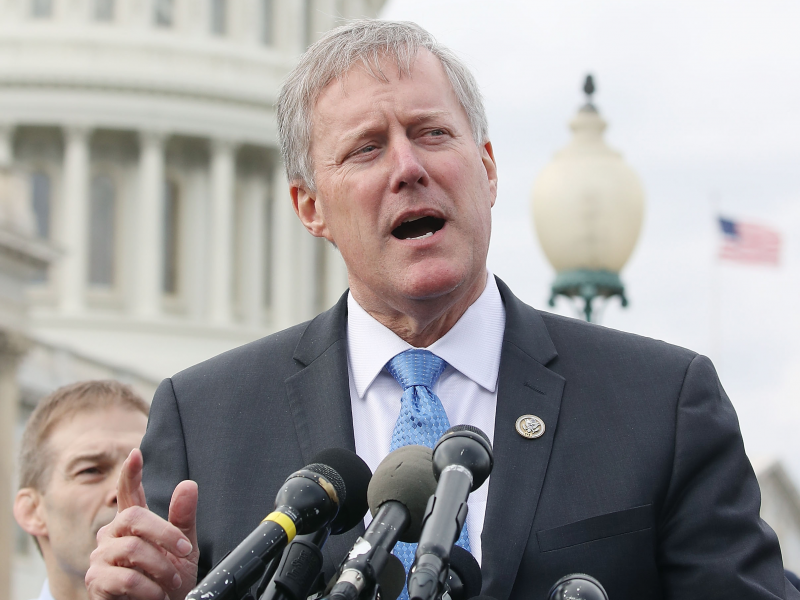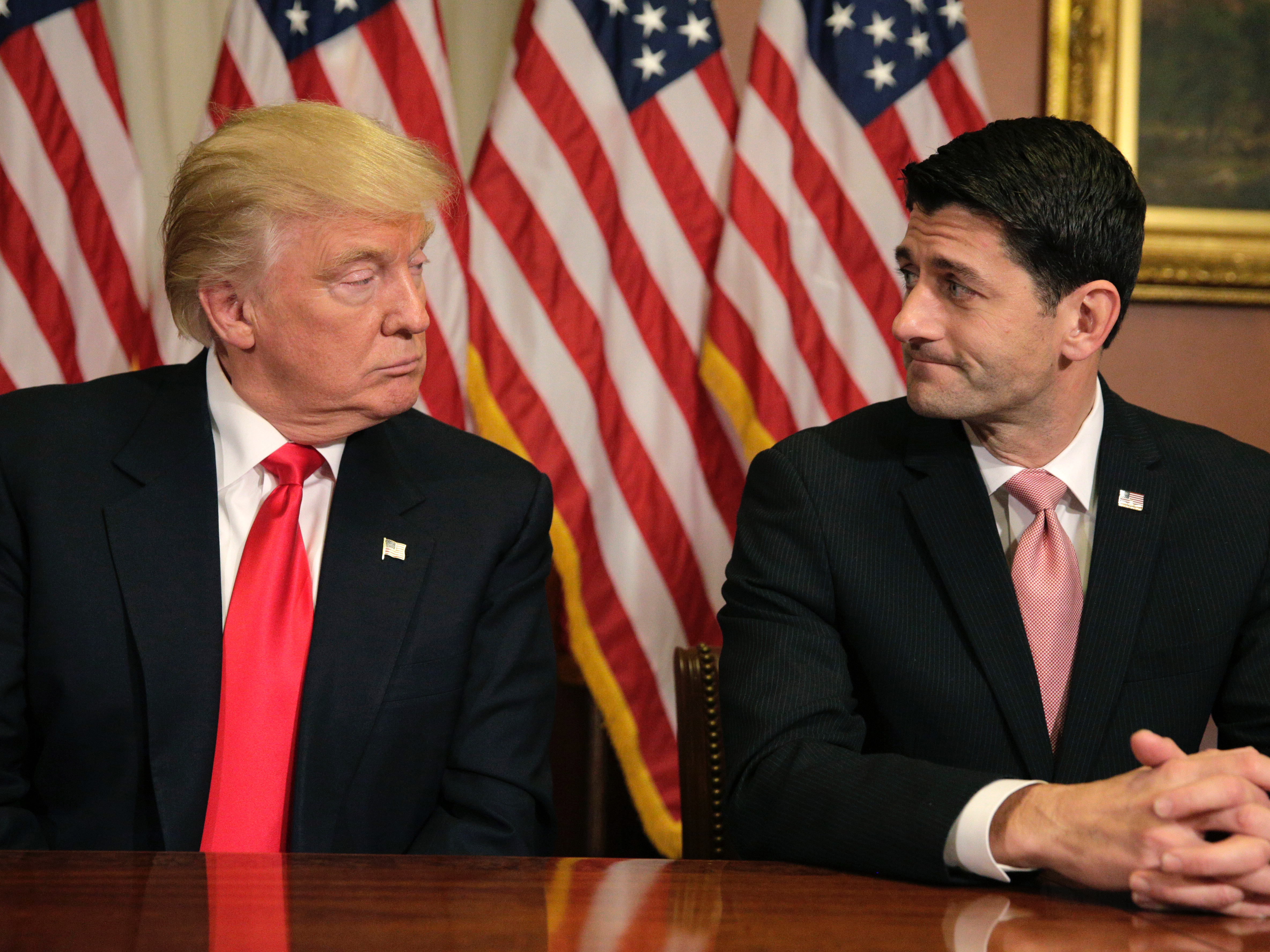The Republican effort to overhaul the US healthcare system faces its biggest test yet Thursday as members of the House of Representatives are expected to vote on the American Health Care Act.
Despite a push from President Donald Trump and administration officials, Republicans from both the conservative and moderate wings of the party have come out against the bill, saying it either does not go far enough in its repeal of or does not make enough improvements to the Affordable Care Act, the healthcare law better known as Obamacare.
Members have spent the day meeting with leaders, hardline conservative members of the House Freedom Caucus went to the White House for a meeting with Trump while more moderate members met with House Speaker Paul Ryan on Capitol Hill.
Based on early reports from those meetings, it appears the AHCA does not have enough support to pass a House vote.
Around 1:30 p.m. ET, Freedom Caucus members leaving the White House meeting told reporters that “no deal” had been reached and no changes had been agreed to.
According to The New York Times' tracker of House members' public statements, 31 Republicans have said they will vote against the bill. That is above the 23 defections from the GOP that would sink the bill.
Given the upheaval, Republicans delayed a meeting of their House members originally scheduled for 9 a.m. ET Thursday until after negotiations between GOP holdouts in the bill and the White House.
Additionally, Ryan has pushed back his press conference originally scheduled for 11:30 a.m. ET to 3:30 p.m. ET. According to Dylan Scott at STAT, as of 3:00 p.m. ET Ryan is meeting with House GOP leaders including House Majority Leader Kevin McCarthy and House Whip Steve Scalise.
Rep. Kevin Brady of Texas, head of the Ways and Means Committee and one of the architects of the AHCA, told Fox News that Republicans are in 95% agreement on the bill but leaders still have "work to do" to get enough votes to pass it.
Negotiations with conservatives
The largest bloc that must be won over for Trump and GOP leaders to pass the bill is the conservative House Freedom Caucus.
The group, headed by Rep. Mark Meadows of North Carolina, has been against the AHCA since its introduction, the group says, because the bill does not deliver on the group's promise of fully repealing Obamacare. The GOP rolled out a large amendment on Monday with a series of changes to the bill to win over the Freedom Caucus, but it failed to move the needle.
The group says it has roughly 25 votes against the bill, enough to kill it.
In an attempt to placate the group, Trump has been negotiating directly with conservatives about possible last-minute changes that could make the bill more palatable.
Trump met in the White House on Thursday with the members of the Freedom Caucus, and according to reports made a "final offer" of changes for the AHCA, but they reportedly didn't reach a deal.
According to reports, the White House is willing to drop Obamacare's so-called essential health benefits - the provision that forced insurers to cover certain types of ailments. While this comes with a myriad of issues, not the least of which is possible pushback from moderates, it still does not seem to be enough to win over the Freedom Caucus.
Rep. Jim Jordan of Ohio, a member of the Freedom Caucus, told reporters on Thursday that "it's always been beyond" essential health benefits.
(Read more about the impact of dropping essential health benefits»)

According to Billy House, Anna Edney, and Jennifer Jacobs at Bloomberg, Meadows and the Freedom Caucus have asked that the provision of Obamacare that compels insurers to cover people with preexisting conditions be dropped, which the Trump administration has flatly refused.
"Addressing preexisting conditions has always been a requirement for any replacement plan that HFC would support," Meadows told reporters.
The preexisting-conditions provision is the most popular part of the ACA, with a Harvard Harris poll showing that 90% of Americans supported the measure.
(Read more about the Freedom Caucus demands»)
Moderate defections
The Freedom Caucus is not the only group within the Republican Party coming out against the bill.
Some moderate Republicans have defected from the party line, saying the AHCA does not meet their requirements for an Obamacare replacement plan.
Rep. Charlie Dent of Pennsylvania, a moderate GOP member, on Thursday morning said he would not vote for the bill.
"I believe this bill, in its current form, will lead to the loss of coverage and make insurance unaffordable for too many Americans, particularly for low-to-moderate income and older individuals," Dent said. "We have an important opportunity to enact reforms that will result in real healthcare transformation - bringing down costs and improving health outcomes. This legislation misses the mark."
Rep. Jamie Beutler of Washington also stated an intention to vote against the bill on Thursday, hours before the House vote. Beutler had previously expressed concerns about the changes in the bill to Medicaid.
"I'm disappointed that it appears my amendment to strengthen the Medicaid safety net for the kids who depend on it for their health care will not be considered," said the statement. "Protecting vulnerable children is a core purpose of the Medicaid program and when the program fails to do so, it fails entirely. I will not vote to let those kids fall through the cracks."
Other moderate members like Reps. Frank LoBiondo and Chris Smith of New Jersey along with Rep. David Young of Iowa all came out against the AHCA on Wednesday.
LoBiondo, in fact, said the bill did not even measure up to the Obamacare system.
"It is not as good as or better than what we currently have," LoBiondo said in a statement. "Accordingly, I will vote no on this healthcare plan."
Speaker Ryan held a meeting with moderates on Thursday to win them over to the bill and update them on concessions made to the Freedom Caucus. According to CNN's Phil Mattingly, members left the meeting around 11:30 a.m.
Outside pushback
At the same time as the furious negotiations are happening on Capitol Hill, outside political groups have also taken stances against the AHCA.
Conservative action groups including the Club for Growth, FreedomWorks, and Heritage Action have come out against the bill, saying it does not do enough to alleviate their concerns with Obamacare. In addition, these groups have pegged the AHCA vote to what is called a key vote. This means that if a House member votes for the bill, the person's "score" (a measure of how much the group supports the particular lawmaker) will drop and could in turn affect the House representative's support in the next election.
Additionally, policy groups have warned that the current version of the bill could have serious consequences for the healthcare system. Drew Altman, the CEO of the nonpartisan health-policy think tank Kaiser Family Foundation, wrote for the news website Axios on Wednesday that the bill as written would increase out-of-pocket costs as more people are shifted to high-deductible plans.
Additionally, the Brookings Institution warned that recent amendments to the bill could actually make the number of people losing health coverage because of the AHCA worse than the Congressional Budget Office's original estimate of 24 million over the next 10 years.
Last procedural hurdle
Before the bill can advance to the full House for a vote, there is still one procedural step it has to go through.
The House Rules Committee suspended its hearing on the AHCA on Wednesday after debating the bill for roughly 12 hours. The committee will reconvene Thursday before submitting the bill to the House floor.
The House Rules Committee determines numerous key frameworks for the debate and amendments that can be considered for the bill while it is on the floor.

